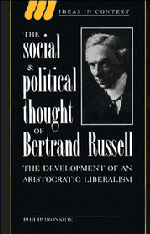Book contents
- Frontmatter
- Contents
- Acknowledgements
- Introduction
- 1 A young man of character
- 2 Fellow-travelling with the Fabians
- 3 Out of the moral gymnasium
- 4 Political science
- 5 The sage of Caxton Hall
- 6 Anarchist tendencies
- 7 Russia, China, and the West
- 8 The Wellsian trajectory
- 9 Ideologies and dystopias
- Epilogue: Russell and the idea of the clerisy
- Notes
- Bibliography
- Index
- IDEAS IN CONTEXT
1 - A young man of character
Published online by Cambridge University Press: 31 August 2009
- Frontmatter
- Contents
- Acknowledgements
- Introduction
- 1 A young man of character
- 2 Fellow-travelling with the Fabians
- 3 Out of the moral gymnasium
- 4 Political science
- 5 The sage of Caxton Hall
- 6 Anarchist tendencies
- 7 Russia, China, and the West
- 8 The Wellsian trajectory
- 9 Ideologies and dystopias
- Epilogue: Russell and the idea of the clerisy
- Notes
- Bibliography
- Index
- IDEAS IN CONTEXT
Summary
Bertrand Russell was born on 18 May 1872 into the Whig aristocracy. His mother was Kate Spencer, the daughter of Lord Stanley of Alderly, his father, Lord Amberley, the son of Lord John Russell. Both grandfathers were Liberal politicians – Stanley only modestly successful, Russell twice Prime Minister and Leader of the Party until shortly before Gladstone formed his first administration in 1868. Russell's parents were Liberal intellectuals, friends and followers of John Stuart Mill, and as a consequence of this relationship he acquired Mill as a godfather. Although Amberley had political ambitions he was only briefly a Member of Parliament, his career being hampered – in his son's opinion – as much by his ‘rigid intellectual honesty’ as by his Millian views, particularly on birth control and female emancipation.
The listing of Russell's Liberal credentials is both irresistible and somewhat misleading, for, although connected at all points with the complexities of mid-Victorian Liberalism, the direct influence of this tradition was drastically reduced by a rapid sequence of deaths. Mill died in France a few days before his godson's first birthday. Russell's mother and sister died of diphtheria in 1874, his father of bronchitis in 1876. His grandfather, Lord John Russell, had retired to Pembroke Lodge in 1868 to – as one commentator remarks – ‘spend his last days in unhinged petulance’, and, following the death of their father, Bertrand and his elder brother Frank were placed in the old man's care.
- Type
- Chapter
- Information
- The Social and Political Thought of Bertrand RussellThe Development of an Aristocratic Liberalism, pp. 10 - 22Publisher: Cambridge University PressPrint publication year: 1995



